New color measuring trends and technologies
Barbieri Electronic of Brixen, Italy is the market leader in the field of color measurement for professional large format, flatbed and industrial printing. The company’s customer base reads like a Who’s Who of professional digital printing.
Across all industries, great importance is attached to absolutely reliable colorimetric values for 100 percent color rendition on different materials. And that is the guarantee given by the family-run international technical laboratory from South Tyrol. The leading innovator and driving force at Barbieri is CTO Markus Barbieri. His involvement in the relevant standardization bodies and research institutes is indicative of his commitment to further development in the areas of exact color measurement, visual perception and faithful reproduction. His aim is always to meet and even exceed the expectations of his customers and end users.
Mr Barbieri, for more than fifteen years you have been a leading player in various standardization bodies. What developments have taken place during this time?
On the basis of recent scientific findings, the focus of attention has shifted to the role played by the light source of the measuring instruments used. The UV component of the light in particular was neglected in the past. In the latest standards, therefore, the illumination used has been defined beyond the visual range so that we can provide more reliable measuring data. Barbieri is one of the first manufacturers worldwide to implement this new standard. There has also been significant further development and standardization in terms of the correct communication of color in file formats (pdf standards). It is this spectral formulation of color values and the description of how colors look on different surfaces that have enabled graphic designers, print service providers and brand owners to communicate colors correctly.
Your latest product has met with great enthusiasm from customers worldwide. In your eyes, what is the most outstanding feature of the Spectro LFP qb?
Here I should like to emphasize the increased measuring accuracy achieved through the introduction of our new qb technology. Users are particularly enthusiastic about the measuring speed and the sheer versatility of the instrument. Our sensing unit is also unique, offering a wide variety of new options through Computer Vision. Then of course, there is the detachable measuring head for outstanding flexibility.
With the new Spectro LFP qb you are also reaching out to new markets. Which are they exactly, and what can you offer them?
One of the new markets is textile printing. Here we are talking about what is called soft signage as well as increasing volumes of industrial textile printing. In this context, the Spectro LFP qb has some extremely important features which permit precision measuring of digitally printed textiles for the first time. For starters there is the 8 mm measuring aperture, which is fundamental for accurate measurement results on structured materials. Then there is the detachable measuring head for spot color measurements and subsequent reproduction. That makes the Spectro LFP qb the first and only instrument that offers manual, flexible spot color measurement and calibrates printers as an automatic measuring device. So we guarantee consistent results with one and the same measuring instrument.
If you take a look into the future, what does it have in store for us? Is a new revolution round the corner, comparable to the transition from analogue to digital?
I’ve just got back from the last meeting of the ICC working group (International Color Consortium). Currently we are targeting improved communication of the visual perception of colors for different environments. Over time this will lead to new printing technologies like 3D color printing. These new applications offer reproduction results that are as realistic as possible and open up completely new possibilities for creative designers. I find it extremely exciting to see how we can describe human perceptions in metrological terms and thus explore new avenues of near-realistic reproduction. At the end of the day, it's all about going yet another step in further fulfilling user expectations.





